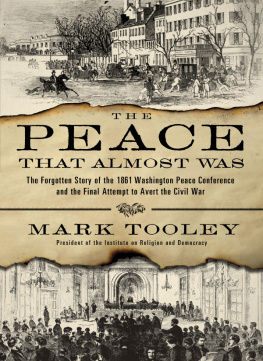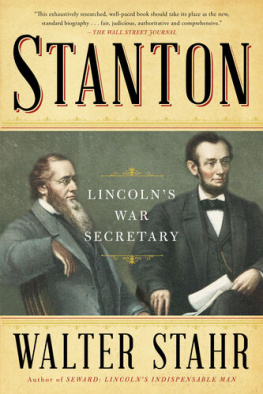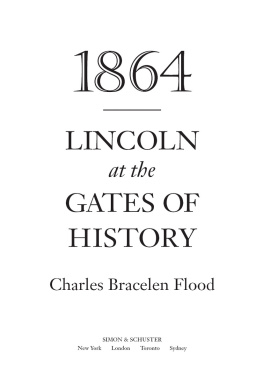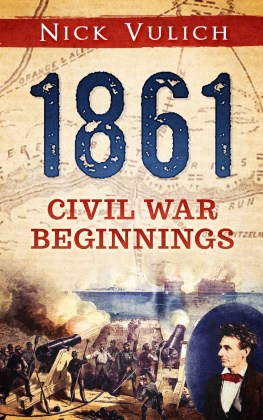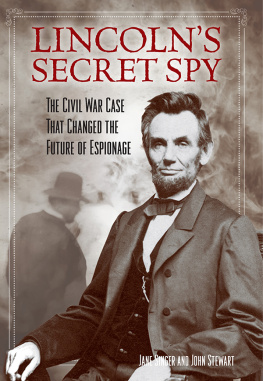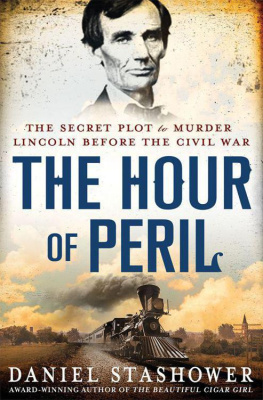
PRAISE FOR
THE PEACE THAT ALMOST WAS
The Peace That Almost Was is a thoroughly researched and engagingly written history of a crucial but mostly forgotten moment in American history, one that serves as a vivid reminder of how dangerous compromise can sometimes be.
John Bicknell, author of America 1844
A truly neglected subject, too long overlooked, has now inspired a well-researched, evocatively recounted history. No one can possibly appreciate the drama that preceded and provoked the American Civil War without understanding the idea, and failure, of the Washington Peace Conference. The event and the author have finally met. The result is highly recommended.
Harold Holzer, winner of the Lincoln Prize
I most appreciate [Tooleys] insights into the roles that Christian ministers and churches played in the struggle between war and peace. Faith mattersand Tooley lifts up this often overlooked dimension of Americas struggle for its soul.
Ronald C. White Jr., author of A. Lincoln: A Biography and Lincolns Greatest Speech: The Second Inaugural
Tooley brings to life a fascinating cast of characters, from politicians to ministers to socialites, who prayed for peace but could find no way to avert the sectional clash over slavery.
Thomas S. Kidd, professor of history, Baylor University
Mark Tooley's swift, direct narrative of the Washing Peace Conference illuminates the last pause before the deluge of war with a rare combination of pathos and nobility.
Dr. Allen C. Guelzo, Henry R. Luce professor of the Civil War Era and director of the Civil War Era Studies Program at Gettysburg College
A delightful story revisited, of personalities, politicians, and political failure to prevent the American Civil War. A must read for understanding peace processes, negotiation hurdles, and intractable issues faced by leaders in any time or place.
B. F. Cooling, author of Symbol, Sword, and Shield: Defending Washington During the Civil War
2015 by Mark Tooley
All rights reserved. No portion of this book may be reproduced, stored in a retrieval system, or transmitted in any form or by any meanselectronic, mechanical, photocopy, recording, scanning, or otherexcept for brief quotations in critical reviews or articles, without the prior written permission of the publisher.
Published in Nashville, Tennessee, by Nelson Books, an imprint of Thomas Nelson. Nelson Books and Thomas Nelson are registered trademarks of HarperCollins Christian Publishing, Inc.
Interior designed by Mallory Perkins.
Thomas Nelson, Inc., titles may be purchased in bulk for educational, business, fund-raising, or sales promotional use. For information, please e-mail SpecialMarkets@ThomasNelson.com.
Unless otherwise noted, Scripture quotations are taken from THE ENGLISH STANDARD VERSION. 2001 by Crossway Bibles, a division of Good News Publishers. Scripture quotations marked KJV are from the KING JAMES VERSION.
Unless otherwise noted, images are from the Library of Congresss Prints and Photographs Division.
ISBN 978-0-7180-2224-2 (eBook)
Library of Congress Cataloging-in-Publication Data
Library of Congress Cataloging-in-Publication Data
Tooley, Mark, 1965
The peace that almost was: the forgotten story of the 1861 Washington Peace Conference and the final attempt to avert the Civil War / Mark Tooley.
pages cm
Includes bibliographical references.
ISBN 978-0-7180-2223-5
1. Conference Convention (1861: Washington, D.C.) 2. United StatesPolitics and government18571861. I. Title.
E440.5.T66 2015
320.97309'034dc23
2014038442
15 16 17 18 19 RRD 6 5 4 3 2 1
CONTENTS
A house divided against itself cannot stand.
Abraham Lincoln
The Civil War would kill more than 700,000 and leave wounds on the nation that took a century or more to heal. In February 1861 scores of Americas leading statesmen frantically gathered at the storied Willards Hotel in Washington, DC, to negotiate how to avoid disunion and war. Seven states had already seceded in reaction to Abraham Lincolns election as president. Several more were poised to follow. Federal property in the South was being seized. On the day the Peace Conference began, the new Confederate government convened in Montgomery, Alabama.
The instigator and guiding force for the Peace Conference was former president John Tyler, referred to sometimes as His Accidency because he was Americas first chief executive to gain office not by direct election but the death of his predecessor, William Henry Harrison. A patrician of noble bearing from an old Virginia family, the aging Tyler reemerged from a long retirement on his James River plantation to preside over the Peace Conference.
Tyler was accompanied by his vivacious and much younger wife, Julia, who was all too glad to return to the city where she had presided regally as First Lady when only in her early twenties. The social apex of her month in the nations capital during the winter of 1861 was a lavish ball at the home of failed presidential candidate Stephen Douglas. More than four hundred of Washingtons elite were there, including many peace commissioners, many of whom rushed over after a White House reception.
The Tylers had just missed their old friends Jefferson and Varina Davis, who had tearfully quit Washington only days before the Tylers arrival. Senator Davis had resigned from the US Senate in solidarity with his departing Mississippi. Soon he would be president of the new Confederacy, with Varina as the Souths new First Lady. The Davises had long lived next door to defeated presidential candidate Senator Stephen Douglas on a prestigious Washington street. The same street was home to Vice President John Breckinridge, another failed 1860 presidential candidate defeated by Lincoln, who would soon serve the Confederacy as a general. During that February of 1861 he presided over the US Senate as it received the Electoral College results electing Lincoln.
Presiding over Washington and the nation during the final tremulous weeks of his presidency, James Buchanan was a longtime friend to the Tylers and Davises, and to many others who were leaders in the unfolding drama at the Willards Hotel. Buchanan had served his country since he was a young soldier in the War of 1812. He was deeply devoted to the Union while sympathetic to Southern determination to protect slavery. Now as that Union fractured, he was uncertain what power he had to sustain it, leaving both Unionists and Secessionists perpetually exasperated with him.
Buchanan was arguably the most experienced man ever to assume the presidency, having served as state legislator, US congressman, US senator, secretary of state, ambassador to both Russia and Britain, and a college president, plus his military service. But he was ill prepared for this national crisis, having declared at the advent of his presidency that the issue of slavery had been permanently settled by the US Supreme Court, whose Dred Scott ruling had declared all blacks, even when free, noncitizens.
Since Buchanan was a lifelong bachelor, his handsome niece Harriet Lane served as the countrys First Lady. She was only in her twenties but socially confident, if deemed cold and reserved by some. She was friends with Julia Tyler and Varina Davis and virtually all other notables who were in or had just left Washington as the Peace Conference convened. It was she who artfully helped the president preside over his final lavish White House social entertainments, including the New Years Day open house and the monthly levees of January and February. Typically thronging with Southerners and Buchanans fellow Democrats, many of whom were now leaving town, suddenly the White House was filled with newly arriving Republicans, with whom Buchanan maintained a reserved cordiality.
Next page
